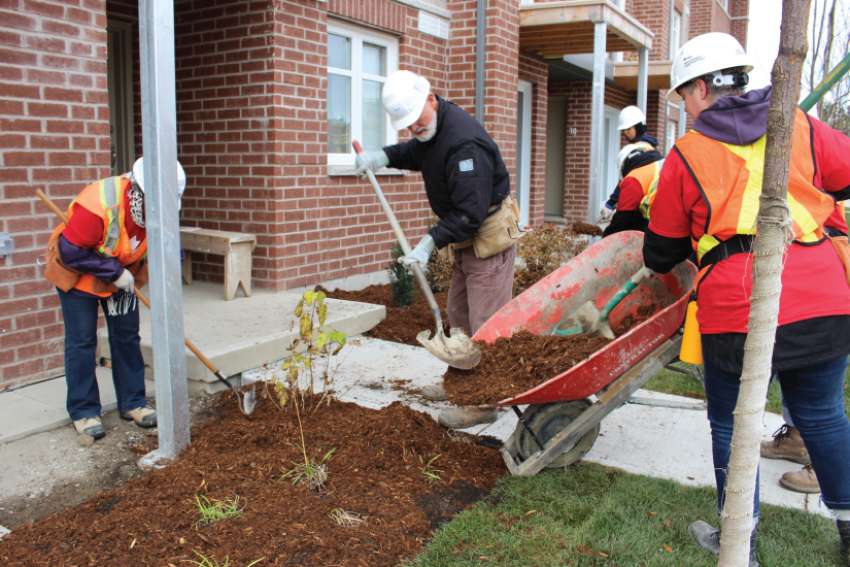The federal government’s housing strategy, released Nov. 22, will enshrine housing as a basic human right. Catholic agencies say it’s about time.
Photo by Meggie Hoegler
Advocates applaud national housing plan
By Michael Swan, The Catholic Register
Catholic agencies that serve the poor have waited a long time for Prime Minister Justin Trudeau’s National Housing Day announcement of a potential $40 billion over 10 years to fund a national housing strategy.
“We were the only country in the northern hemisphere that had no housing strategy,” said Good Shepherd Ministries executive director Br. Richard MacPhee of the Hospitaller Order of St. John of God.
“Catholic Charities’ member agencies know first-hand how important housing is for the people who turn to them,” said Catholic Charities social justice and advocacy program manager Jack Panozzo. “The best thing that can be said about the national housing strategy is that the federal government is once again committed to housing and recognizes housing as a basic human right.”
The strategy, announced Nov. 22, includes enshrining housing as a human right, a promise to cut chronic homelessness in half over the next 10 years, constructing 100,000 new units and committing $4 billion for the Canada Housing Benefit to help renters. The strategy is dependent on sharing costs with provinces and municipalities.
“The fact that the government stepped up in the way that it has … is most significant,” said Covenant House executive director Bruce Rivers. “It’s something our organization and others have been looking for and asking for for some time. This is a major step in the right direction and we’re happy.”
However, the strategy is probably not everything housing advocates were hoping for, said Wellesley Institute senior researcher and housing policy expert Greg Suttor.
“In some respects, the dollars are probably not sufficient to achieve the stated goals,” Suttor told The Catholic Register.
Some of the most significant new spending is pushed out beyond the 2019 federal election, particularly the Canada Housing Benefit which starts in 2020. But even once the cheques are in the mail, the rent subsidies for low-income families won’t solve the problem in expensive, big-city rental markets.
“If you provide a housing benefit of $200 a month, which is what’s implied, you’re not going to take people out of core need,” said Suttor. “If you are a household that makes $2,000 a month and you’re paying $1,000 in rent, theoretically you’re only paying $800 in rent (once the subsidy kicks in). You’re still in core need. You’re still spending 40 per cent of your income on housing.”
For one of Canada’s leading researchers on housing and homelessness, the details can be debated later.
“Basically, I am delighted about the new housing strategy,” said Dr. Stephen Hwang, director of the Centre for Urban Health Solutions at Toronto’s St. Michael’s Hospital. “While some may criticize it as being too little or too slow, I think that it is of great importance because it is a commitment to take steps in the right direction.”
For the Sisters of St. Joseph of Toronto and their Fontbonne Ministries initiatives, it’s the possibility of creating more supportive housing to meet the needs of older, single women that is really exciting.
“As Christians, we have a responsibility to make sure that our society is one that cares for those who are most vulnerable. If we’re doing that, I think that trickles up throughout society,” said Fontbonne Ministries administrator Leanne Kloppenborg.
If there’s money on the table, Good Shepherd Ministries is ready to build, said MacPhee.
“If the Church can come together and say, ‘We want to put our money and resources where we can turn around and make something different for people,’ I think that’s a call to action for our Church. It’s a call to live the Gospel,” he said.
MacPhee hopes ordinary Catholics begin to see the homeless as people whose human rights have been denied and violated.
“People need to turn around and when they walk into their own door every night and they can turn that key — what does that place, a home, mean to them? What would it mean if they didn’t have that key? If they didn’t have that place to call home?” he said. “It is a right.”
MacPhee also subscribes to trickle-up economics.
“If you deal with some of the vulnerable groups of people and build some new housing, it may in fact open up some housing opportunities for other people in the middle class,” he said.
Suttor predicts there will be opportunities for parishes, religious orders and Church agencies to get involved in providing housing.
Please support The Catholic Register
Unlike many media companies, The Catholic Register has never charged readers for access to the news and information on our website. We want to keep our award-winning journalism as widely available as possible. But we need your help.
For more than 125 years, The Register has been a trusted source of faith-based journalism. By making even a small donation you help ensure our future as an important voice in the Catholic Church. If you support the mission of Catholic journalism, please donate today. Thank you.
DONATE

